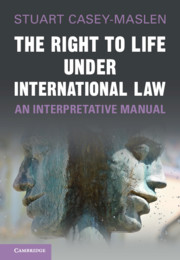Book contents
- The Right to Life under International Law
- The Right to Life under International Law
- Copyright page
- Contents
- Foreword
- Acknowledgements
- Table of Cases
- An Historical Introduction to the Right to Life
- Part I Overview of the Right to Life under International Law
- Part II Major Themes
- Part III The Protection of At-Risk Groups and Individuals
- Part IV Accountability
- 32 The Right to Life and State Responsibility
- 33 The Right to Life and the Responsibility of International Organisations
- 34 Corporate Responsibility and the Right to Life
- 35 The Right to Life and the Responsibility of Non-State Armed Groups
- 36 The Right to Life and Non-governmental Organisations
- 37 The Right to Life and the Responsibility of Individuals
- Part V Human Rights Machinery Protecting the Right to Life
- Part VI Outlook
- Index
37 - The Right to Life and the Responsibility of Individuals
from Part IV - Accountability
Published online by Cambridge University Press: 02 September 2021
- The Right to Life under International Law
- The Right to Life under International Law
- Copyright page
- Contents
- Foreword
- Acknowledgements
- Table of Cases
- An Historical Introduction to the Right to Life
- Part I Overview of the Right to Life under International Law
- Part II Major Themes
- Part III The Protection of At-Risk Groups and Individuals
- Part IV Accountability
- 32 The Right to Life and State Responsibility
- 33 The Right to Life and the Responsibility of International Organisations
- 34 Corporate Responsibility and the Right to Life
- 35 The Right to Life and the Responsibility of Non-State Armed Groups
- 36 The Right to Life and Non-governmental Organisations
- 37 The Right to Life and the Responsibility of Individuals
- Part V Human Rights Machinery Protecting the Right to Life
- Part VI Outlook
- Index
Summary
Under international law, individual responsibility exists for violation of jus cogens norms, which include arbitrary deprivation of life, resulting from acts or omissions. Peremptory norms of international law are binding not only on all States, corporations, armed groups, and organisations, but also on individuals. As the Independent International Commission of Inquiry on the Syrian Arab Republic declared in 2012: ‘at a minimum, human rights obligations constituting peremptory international law (ius cogens) bind States, individuals and non-State collective entities, including armed groups’. While the most obvious route for realising individual responsibility for a violation of the right to life is through the criminal law – domestic or international – there are also civil remedies available in certain States. This is most notably the case in the United States (US), based on the Alien Tort Statute of 1789 or actions under Section 1983 of the US Code.
- Type
- Chapter
- Information
- The Right to Life under International LawAn Interpretative Manual, pp. 680 - 688Publisher: Cambridge University PressPrint publication year: 2021



